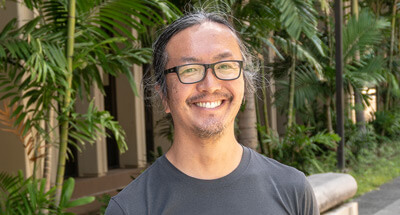
Akihiko Masuda
Professor
Office: Sakamaki D409
Telephone: 1 (808) 956-0287
Email: amasuda4@hawaii.edu
Browse My Publications:
Background
I am a professor of psychology at the University of Hawaiʻi at Mānoa. I was born and raised in Nagano, Japan, and moved to the United States for my undergraduate education in psychology. I study psychology and health science because these are the disciplines that allow us to explore both who we are as human beings and what we would like to be. My primary areas of interest in research and practice are broad, including health disparities, multicultural competence and humility, acceptance- and mindfulness-based behavioral therapies, diversity psychology, and Zen Buddhism. I am the author of more than 90 peer-reviewed papers and over 40 book chapters. My edited volumes include Mindfulness and Acceptance in Multicultural Competency (New Harbinger, 2014), Handbook of Zen, Mindfulness and Behavioral Health (Springer, 2017), and Prejudice, Stigma, Privilege, and Oppression: A Behavioral Health Handbook (Springer, 2020).
Education
- PhD, Clinical Psychology, University of Nevada, 2006
- MA, Psychology, University of the Pacific 1999
- BA, Psychology, West Virginia University, 1997
Courses
- PSY 100: Survey of Psychology
- PSY 671: Introduction to Assessment I
- PSY 672: Introduction to Assessment II
- PSY 775: Seminar in Psychological Therapies
Research
My research program has three strategic foci, which all serve my primary aim of evaluating and refining our understanding of behavioral health and well-being as well as ways to promote them. To do so, I have followed a contextual behavioral science (CBS) account of human conditions and behavior change. First, my research examines the applicability of the CBS model to topographically diverse and relatively understudied problem areas, such as self-concealment, stigma, and disordered eating concerns. In this focal domain, I also have conducted numerous acceptance and commitment therapy (ACT) studies. Second, I am extending the psychological flexibility model to underrepresented populations, to issues of health disparities, and to culturally competent and humble practice in behavioral health.
